Bildung, Kompetenzen und Arbeitsmarkt
Die Forschungsgruppe erforscht die Entstehung und die Auswirkungen von Kompetenzen. Als wesentliche Bestimmungsfaktoren für die Entwicklung von Kompetenzen untersucht die Gruppe insbesondere den familiären Hintergrund, schulische Bildung und Weiterbildung am Arbeitsplatz. Effekte höherer Kompetenzen auf den Arbeitsmarkterfolg werden über die gesamte berufliche Laufbahn hinweg analysiert. Außerdem beschäftigt sich die Gruppe mit Veränderungen in der Nachfrage nach Kompetenzen infolge von technologischem und strukturellem Wandel.
Forschungscluster
Produktivität und InstitutionenIhr Kontakt

- Abteilung Strukturwandel und Produktivität
Referierte Publikationen
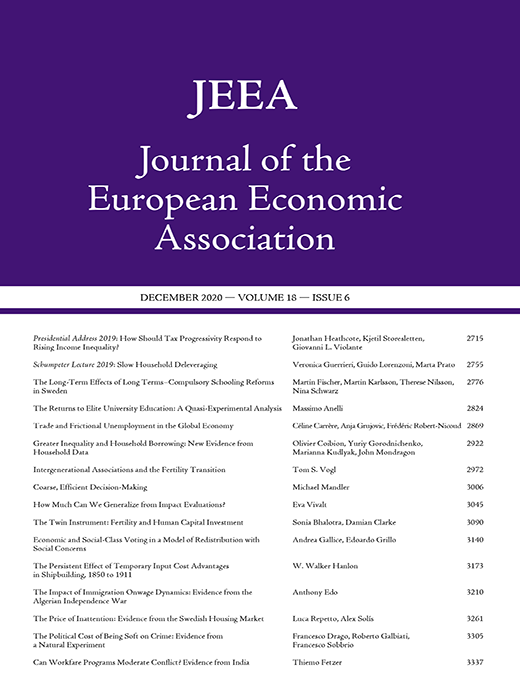
Application Barriers and the Socioeconomic Gap in Child Care Enrollment
in: Journal of the European Economic Association, im Erscheinen
Abstract
<p>Why are children with lower socioeconomic status (SES) substantially less likely to be enrolled in child care? We study whether barriers in the application process work against lower-SES children — the group known to benefit strongest from child care enrollment. In an RCT in Germany with highly subsidized child care (N = 607), we offer treated families information and personal assistance for applications. We find substantial, equity-enhancing effects of the treatment, closing half of the large SES gap in child care enrollment. Increased enrollment for lower-SES families is likely driven by altered application knowledge and behavior. We discuss scalability of our intervention and derive policy implications for the design of universal child care programs.</p>
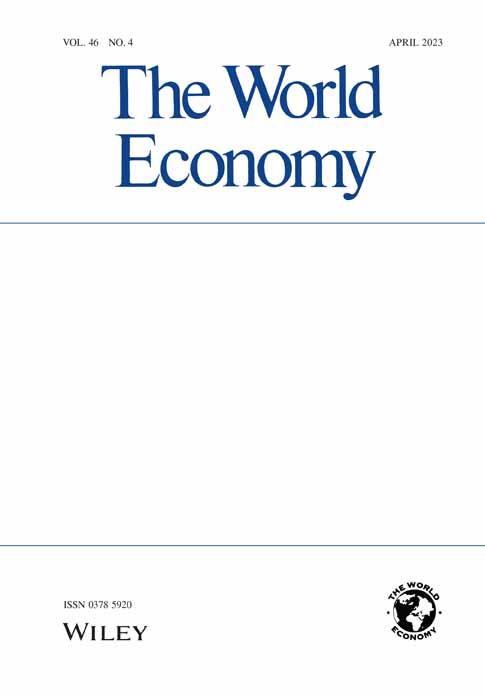
Why Is the Roy-Borjas Model Unable to Predict International Migrant Selection on Education? Evidence from Urban and Rural Mexico
in: World Economy, im Erscheinen
Abstract
<p>The Roy-Borjas model predicts that international migrants are less educated than nonmigrants because the returns to education are generally higher in developing (migrant-sending) than in developed (migrant-receiving) countries. However, empirical evidence often shows the opposite. Using the case of Mexico-U.S. migration, we show that this inconsistency between predictions and empirical evidence can be resolved when the human capital of migrants is assessed using a two-dimensional measure of occupational skills rather than by educational attainment. Thus, focusing on a single skill dimension when investigating migrant selection can lead to misleading conclusions about the underlying economic incentives and behavioral models of migration.</p>
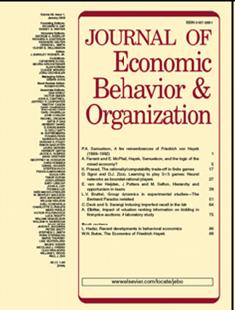
Information about Inequality in Early Child Care Reduces Polarization in Policy Preferences
in: Journal of Economic Behavior and Organization, December 2024
Abstract
<p>We investigate public preferences for equity-enhancing policies in access to early child care, using a survey experiment with a representative sample of the German population (n ≈ 4, 800). We observe strong misperceptions about migrant-native inequalities in early child care that vary by respondents’ age and right-wing voting preferences. Randomly providing information about the actual extent of inequalities has a nuanced impact on the support for equity-enhancing policy reforms: it increases support for respondents who initially underestimated these inequalities, and tends to decrease support for those who initially overestimated them. This asymmetric effect leads to a more consensual policy view, substantially decreasing the polarization in policy support between under- and overestimators. Our results suggest that correcting misperceptions can align public policy preferences, potentially leading to less polarized debates about how to address inequalities and discrimination.</p>
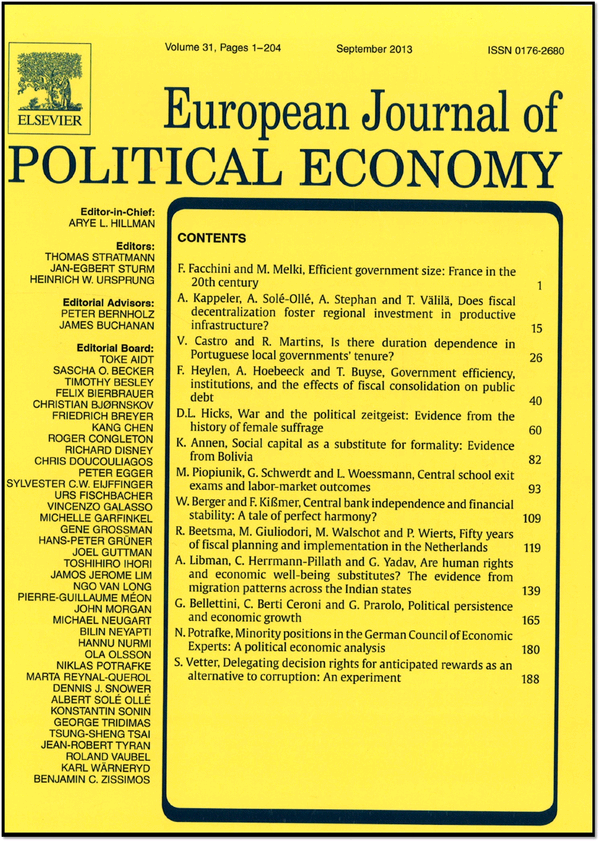
Import Shocks and Voting Behavior in Europe Revisited
in: European Journal of Political Economy, June 2024
Abstract
We provide first evidence for the long-run causal impact that Chinese imports to European regions had on voting outcomes and revisit earlier estimates of the short-run impact for a methodological reason. The fringes of the political spectrum gained ground many years after the China shock plateaued and, unlike an earlier study by Colantone and Stanig (2018b), we do not find any robust evidence for a short-run effect on far-right votes. Instead, far-left and populist parties gained in the short run. We identify persistent long-run effects of import shocks on voting. These effects are biased towards populism and, to a lesser extent, to the far-right.
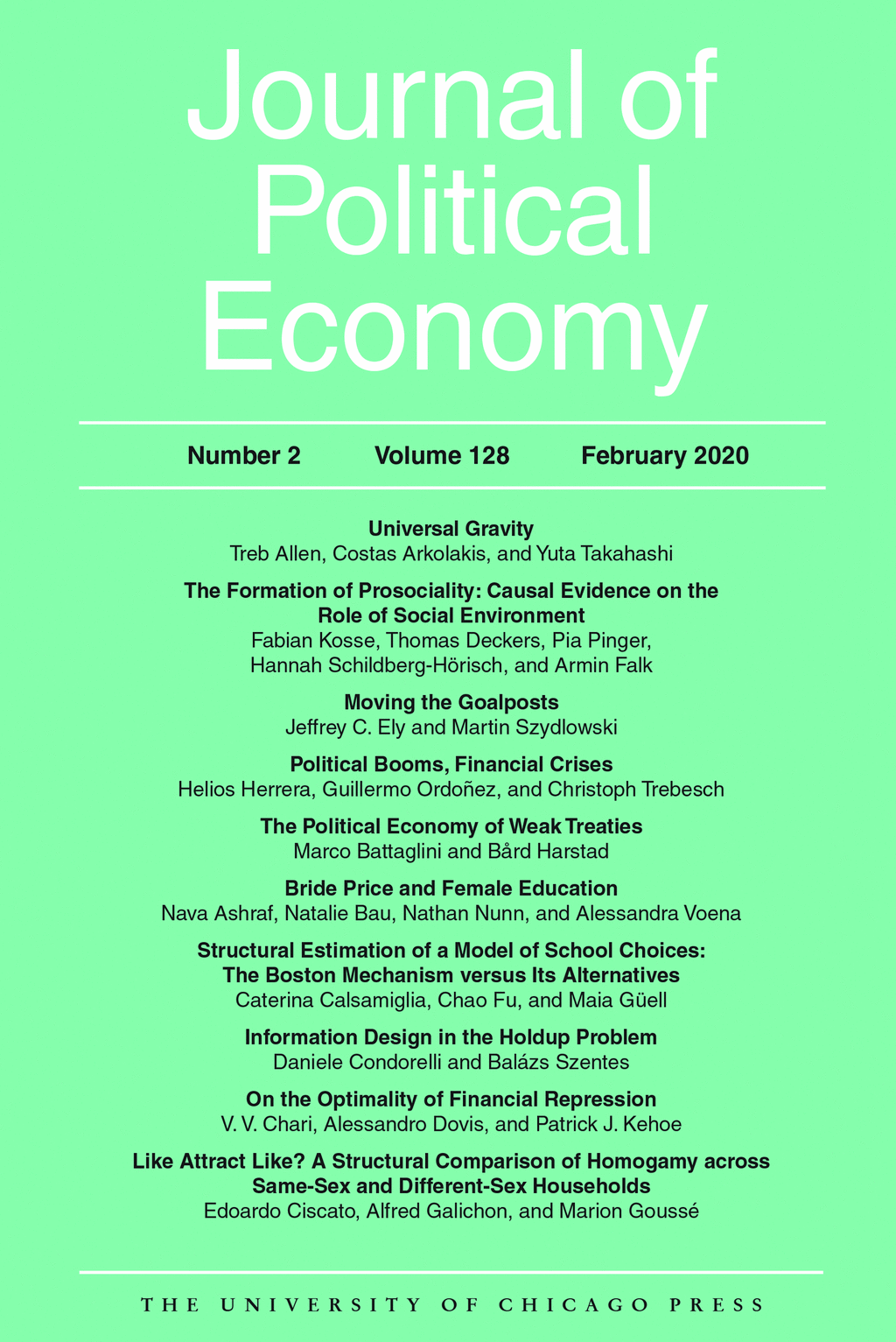
Can Mentoring Alleviate Family Disadvantage in Adolescence? A Field Experiment to Improve Labor-Market Prospects
in: Journal of Political Economy, Nr. 3, 2024
Abstract
<p>We study a mentoring program that aims to improve the labor-market prospects of school-attending adolescents from disadvantaged families by offering them a university-student mentor. Our RCT investigates program effectiveness on three outcome dimensions that are highly predictive of later labor-market success: math grades, patience/social skills, and labor-market orientation. For low-SES adolescents, the mentoring increases a combined index of the outcomes by over half a standard deviation after one year, with significant increases in each dimension. Part of the treatment effect is mediated by establishing mentors as attachment figures who provide guidance for the future. Effects on grades and labor-market orientation, but not on patience/social skills, persist three years after program start. By that time, the mentoring also improves early realizations of school-to-work transitions for low-SES adolescents. The mentoring is not effective for higher-SES adolescents. The results show that substituting lacking family support by other adults can help disadvantaged children at adolescent age.</p>
Arbeitspapiere
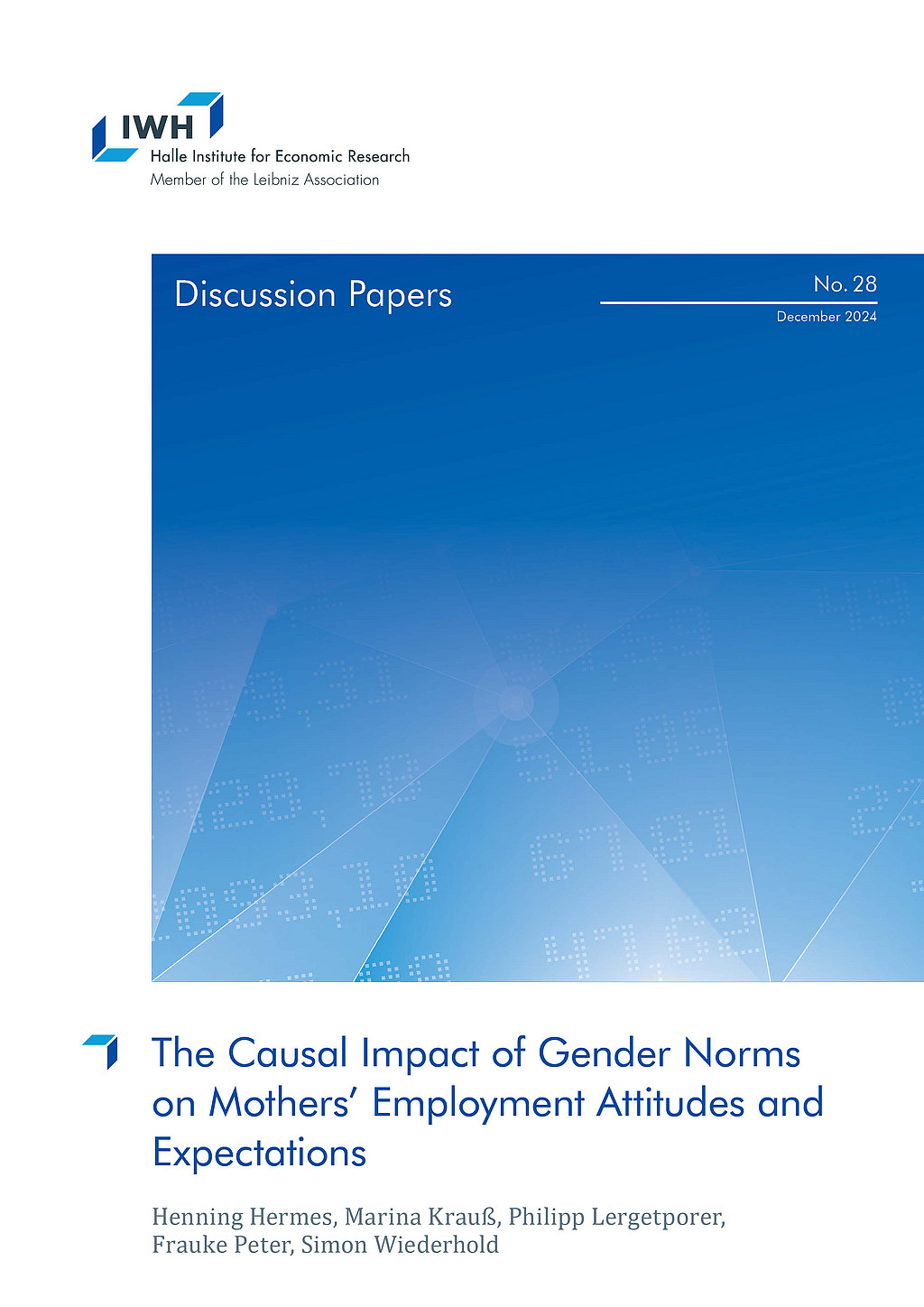
The Causal Impact of Gender Norms on Mothers’ Employment Attitudes and Expectations
in: IWH Discussion Papers, Nr. 28, 2024
Abstract
<p>This field experiment investigates the causal impact of mothers’ perceptions of gender norms on their employment attitudes and labor-supply expectations. We provide mothers of young children in Germany with information about the prevailing gender norm regarding maternal employment in their city. At baseline, over 70% of mothers incorrectly perceive this gender norm as too conservative. Our randomized treatment improves the accuracy of these perceptions, significantly reducing the share of mothers who misperceive gender norms as overly conservative. The treatment also shifts mothers’ own labor-market attitudes towards being more liberal – and we show that specifically the shifted attitude is a strong predictor of mothers’ future labor-market participation. Consistently, treated mothers are significantly more likely to plan an increase in their working hours one year ahead.</p>
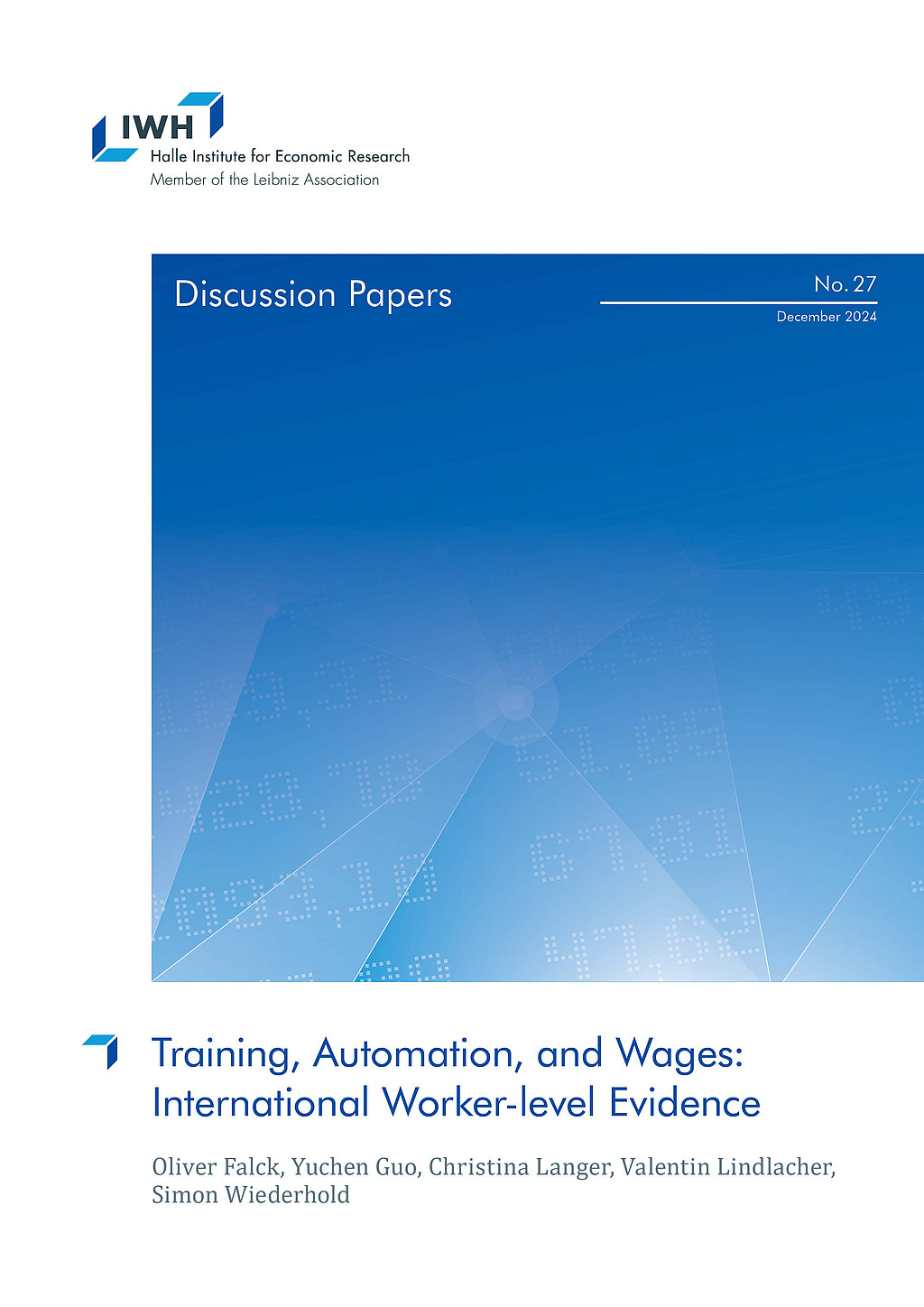
Training, Automation, and Wages: International Worker-level Evidence
in: IWH Discussion Papers, Nr. 27, 2024
Abstract
<p>Job training is widely regarded as crucial for protecting workers from automation, yet there is a lack of empirical evidence to support this belief. Using internationally harmonized data from over 90,000 workers across 37 industrialized countries, we construct an individual-level measure of automation risk based on tasks performed at work. Our analysis reveals substantial within-occupation variation in automation risk, overlooked by existing occupation-level measures. To assess whether job training mitigates automation risk, we exploit within-occupation and within-industry variation. Additionally, we employ entropy balancing to re-weight workers without job training based on a rich set of background characteristics, including tested numeracy skills as a proxy for unobserved ability. We find that job training reduces workers’ automation risk by 4.7 percentage points, equivalent to 10 percent of the average automation risk. The training-induced reduction in automation risk accounts for one-fifth of the wage returns to job training. Job training is effective in reducing automation risk and increasing wages across nearly all countries, underscoring the external validity of our findings. Women tend to benefit more from training than men, with the advantage becoming particularly pronounced at older ages.</p>
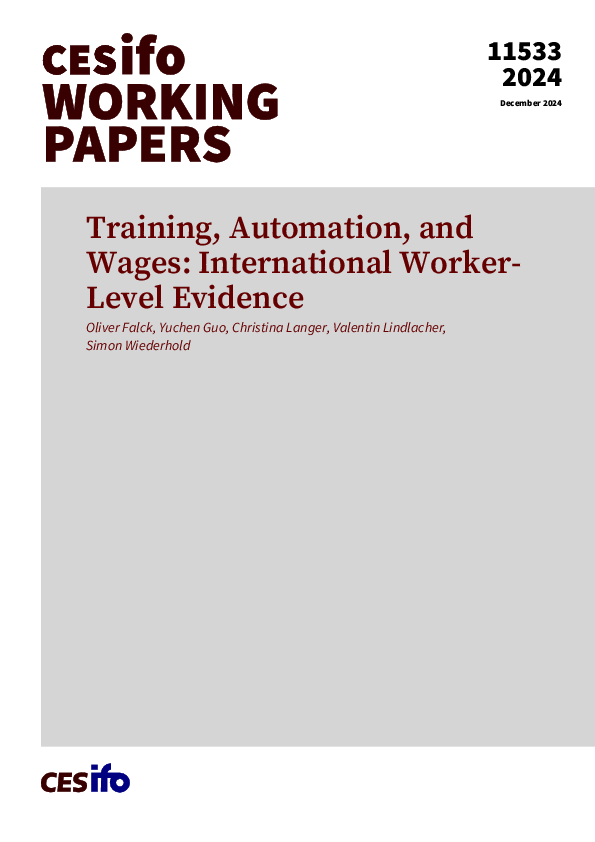
Training, Automation, and Wages: International Worker-level Evidence
in: CESifo Working Papers, Nr. 11533, 2024
Abstract
<p>Job training is widely regarded as crucial for protecting workers from automation, yet there is a lack of empirical evidence to support this belief. Using internationally harmonized data from over 90,000 workers across 37 industrialized countries, we construct an individual-level measure of automation risk based on tasks performed at work. Our analysis reveals substantial within-occupation variation in automation risk, overlooked by existing occupation-level measures. To assess whether job training mitigates automation risk, we exploit within-occupation and within-industry variation. Additionally, we employ entropy balancing to re-weight workers without job training based on a rich set of background characteristics, including tested numeracy skills as a proxy for unobserved ability. We find that job training reduces workers’ automation risk by 4.7 percentage points, equivalent to 10 percent of the average automation risk. The training-induced reduction in automation risk accounts for one-fifth of the wage returns to job training. Job training is effective in reducing automation risk and increasing wages across nearly all countries, underscoring the external validity of our findings. Women tend to benefit more from training than men, with the advantage becoming particularly pronounced at older ages.</p>
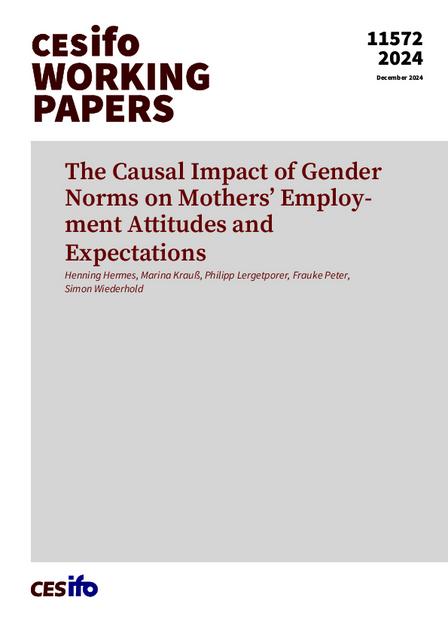
The Causal Impact of Gender Norms on Mothers’ Employment Attitudes and Expectations
in: CESifo Working Papers, Nr. 11572, 2024
Abstract
<p>This field experiment investigates the causal impact of mothers’ perceptions of gender norms on their employment attitudes and labor-supply expectations. We provide mothers of young children in Germany with information about the prevailing gender norm regarding maternal employment in their city. At baseline, over 70% of mothers incorrectly perceive this gender norm as too conservative. Our randomized treatment improves the accuracy of these perceptions, significantly reducing the share of mothers who misperceive gender norms as overly conservative. The treatment also shifts mothers’ own labor-market attitudes towards being more liberal – and we show that specifically the shifted attitude is a strong predictor of mothers’ future labor-market participation. Consistently, treated mothers are significantly more likely to plan an increase in their working hours one year ahead.</p>
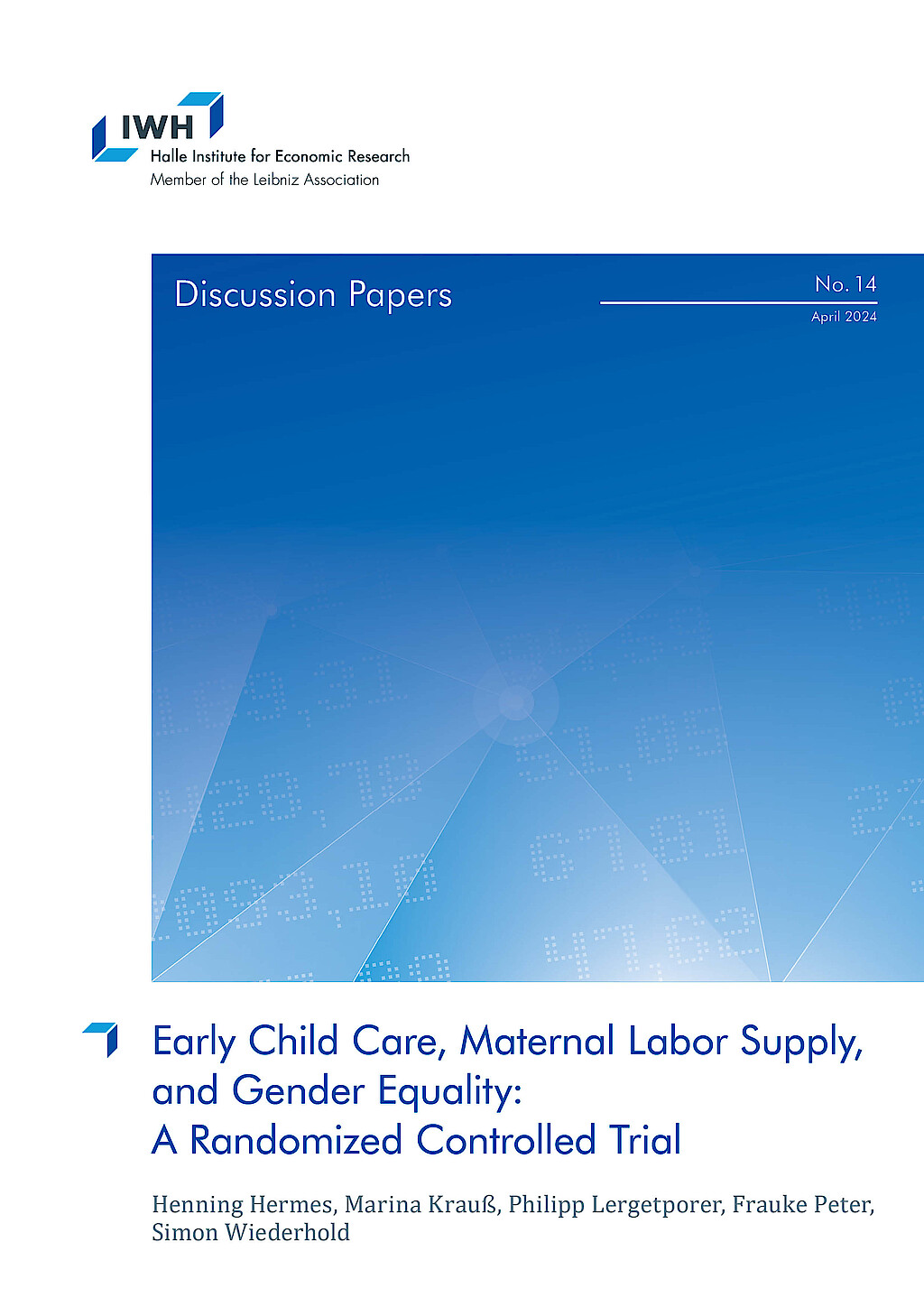
Early Child Care, Maternal Labor Supply, and Gender Equality: A Randomized Controlled Trial?
in: IWH Discussion Papers, Nr. 14, 2024
Abstract
We provide experimental evidence that enabling access to universal early child care increases maternal labor supply and promotes gender equality among families with lower socioeconomic status (SES). Our intervention offers information and customized help with child care applications, leading to a boost in child care enrollment among lower-SES families. 18 months after the intervention, we find substantial increases in maternal full-time employment (+160%), maternal earnings (+22%), and household income (+10%). Intriguingly, the positive employment effects are not only driven by extended hours at child care centers, but also by an increase in care hours by fathers. Gender equality also benefits more broadly from better access to child care: The treatment improves a gender equality index that combines information on intra-household division of working hours, care hours, and earnings by 40% of a standard deviation, with significant increases in each dimension. For higher-SES families, we consistently observe negligible, insignificant treatment effects.













